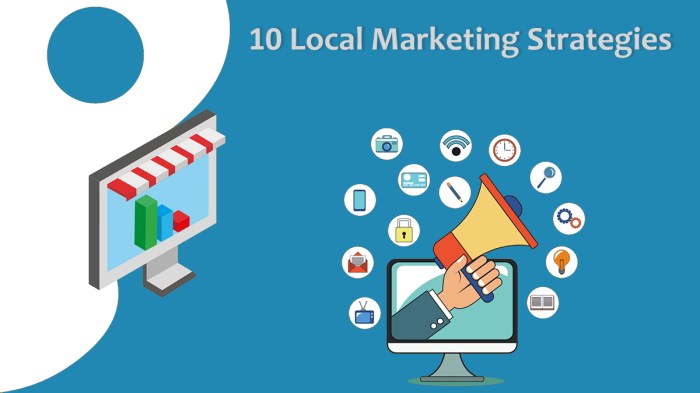Building a Local Marketing Strategy sets the stage for this enthralling narrative, offering readers a glimpse into a story that is rich in detail with American high school hip style and brimming with originality from the outset.
Get ready to dive into the world of local marketing strategies, where creativity meets strategy to drive business success in the digital age.
Define Local Marketing Strategy

Local marketing strategy refers to the specific plan and actions that a business takes to target and engage with customers in a particular geographic location. It focuses on promoting products or services to a local audience in order to drive foot traffic, increase brand awareness, and boost sales within a specific area. Having a strong local marketing strategy is crucial for businesses looking to connect with their community and stand out from competitors.
Examples of Successful Local Marketing Strategies
- Google My Business: By claiming and optimizing their Google My Business listing, businesses can improve their visibility in local search results and attract nearby customers.
- Local Events Sponsorship: Supporting or sponsoring local events like fairs, festivals, or community gatherings can help businesses reach a targeted audience and build relationships within the community.
- Geotargeted Ads: Utilizing geotargeting in digital advertising allows businesses to deliver relevant ads to users based on their location, increasing the chances of converting leads into customers.
Key Components of a Strong Local Marketing Strategy
- Local : Optimizing website content for local s, creating location-specific landing pages, and managing online reviews to improve search engine rankings.
- Social Media Localization: Tailoring social media content and ads to resonate with the local audience, including promoting local events and engaging with community members.
- Community Engagement: Building relationships with local organizations, partnering with influencers or local celebrities, and participating in community activities to establish a strong presence.
Understanding Your Target Audience

In order to create a successful local marketing strategy, it is crucial to understand your target audience in the local community. By knowing who your audience is, you can tailor your marketing efforts to effectively reach and engage with them.
Researching and Analyzing Your Local Target Audience
To research and analyze your local target audience effectively, consider the following methods:
- Conduct surveys or interviews with local community members to gather insights on their preferences and behaviors.
- Utilize social media analytics to understand the demographics and interests of your local audience.
- Study local market research reports to identify trends and patterns in consumer behavior within the community.
Influence of Demographics, Behavior, and Preferences
Demographics, behavior, and preferences play a significant role in shaping local marketing strategies:
- Demographics: Understanding the age, gender, income level, and other demographic factors of your local audience can help you create targeted campaigns that resonate with their specific needs.
- Behavior: Analyzing the buying behavior and habits of your local audience can guide you in developing marketing tactics that appeal to their shopping patterns and decision-making processes.
- Preferences: Knowing the preferences and interests of your local audience allows you to tailor your products, services, and messaging to align with what resonates with them the most.
Utilizing Local
Local plays a crucial role in any marketing strategy, especially for businesses targeting a specific geographical area. It helps improve visibility in local searches, making it easier for potential customers in the area to find your business online.
Tips for Optimizing Local
- Optimize your website with local s: Include location-specific s in your website content, meta descriptions, and title tags to help search engines understand your target location.
- Create a Google My Business account: Claiming and optimizing your Google My Business listing is essential for local . Make sure to include accurate business information, such as your address, phone number, and business hours.
- Get listed in local directories: Ensure your business is listed in online directories like Yelp, Yellow Pages, and other local directories. Consistent NAP (Name, Address, Phone Number) information across all platforms is key.
- Encourage online reviews: Positive reviews on platforms like Google My Business can boost your local search rankings. Encourage satisfied customers to leave reviews and respond to them promptly.
Significance of Google My Business and Other Local Tools
Google My Business is a powerful tool for local as it allows you to manage how your business appears in Google Search and Maps. It provides valuable information to potential customers, such as your location, contact details, reviews, and business hours. Other local tools like Moz Local and BrightLocal can help you monitor and improve your local search performance by tracking your online presence and identifying areas for optimization.
Leveraging Social Media for Local Marketing
Social media is a powerful tool for local marketing, allowing businesses to connect with their target audience in a more personalized way. By utilizing social media platforms effectively, businesses can increase brand awareness, engage with customers, and drive traffic to their physical locations.
Examples of Engaging Social Media Campaigns
- Geo-targeted Ads: Running targeted ads on platforms like Facebook and Instagram allows businesses to reach local audiences based on their location.
- User-generated Content Contests: Encouraging customers to create and share content related to their experience with the brand can help create buzz and attract new customers.
- Local Influencer Partnerships: Collaborating with local influencers or micro-influencers can help businesses reach a wider local audience and build credibility.
Consistent Branding Across Platforms
It is essential for businesses to maintain consistent branding across all social media platforms to ensure a cohesive brand identity and message. Consistency in branding helps build trust and recognition among the target audience. Whether it’s the logo, color scheme, or tone of voice, maintaining a unified brand image is key to successful local marketing efforts.
Building Partnerships with Local Businesses: Building A Local Marketing Strategy
Forming partnerships with other local businesses can offer a range of benefits for your own company. By collaborating with neighboring businesses, you can expand your reach, tap into new customer bases, and enhance your brand visibility and credibility within the community.
Benefits of Forming Partnerships
- Access to new customer segments
- Cost-effective marketing opportunities
- Enhanced brand recognition and credibility
- Shared resources and expertise
Strategies for Creating Mutually Beneficial Partnerships, Building a Local Marketing Strategy
- Identify businesses with complementary products/services
- Offer cross-promotional opportunities
- Collaborate on local events or community initiatives
- Provide exclusive discounts or offers for joint promotions
Enhancing Brand Visibility and Credibility
- Co-hosting events or workshops
- Participating in local charity initiatives together
- Sharing customer testimonials and success stories
- Engaging in joint social media campaigns
